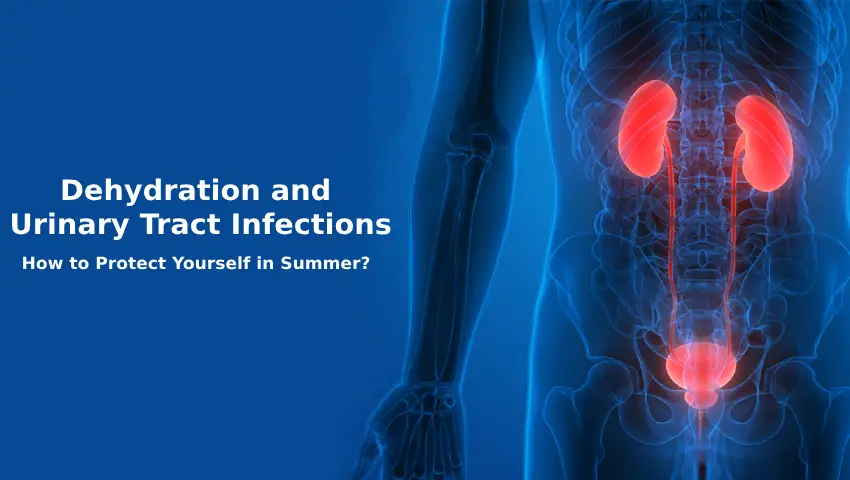
- 17/05/2025
- Dr. Akhil Mane
- 0 Comments
- Urology
Dehydration and Urinary Tract Infections: How to Protect Yourself in Summer?
Summertime brings sunshine, vacations, and outdoor fun—but it also brings a higher risk of dehydration and urinary tract infections (UTIs), specifically if you’re not mindful of your hydration levels. While most people associate dehydration with fatigue and dizziness, not everyone recognizes that it can also make you more vulnerable to urinary tract infections.
As a leading urologist in Pune at Leela Superspeciality Hospital, Dr. Akhil S. Mane often sees a rise in UTI cases during the hotter months. In this blog, he explains the critical link between dehydration and UTIs, the signs you should look out for, and how to safeguard your health throughout the summer.
Understanding the Link Between Dehydration and UTIs:
Dehydration happens when your body loses more fluids than it takes in, often due to heat, sweating, or poor fluid intake. When you’re dehydrated, your body produces less urine, and this is where the problem starts.
Urine plays an important role in flushing bacteria out of the urinary tract. When you urinate frequently, harmful bacteria have less time to cling to the urinary lining and multiply. However, when urine becomes concentrated due to dehydration, it makes an ideal environment for bacterial growth.
Moreover, reduced urine output means bacteria are not being eliminated regularly, raising the risk of infections in the bladder, urethra, and in more severe cases, the kidneys.
Why Summer Increases the Risk?
During summer, your body naturally loses more water through sweat. If you’re not consciously drinking enough fluids to replenish this loss, you become dehydrated quickly. People who are active outdoors, children, older adults, and those with pre-existing health conditions are particularly vulnerable.
Additionally, tight clothing, synthetic underwear, and poor hygiene can further raise the chances of developing a UTI in hot and humid conditions.
Common Symptoms of a UTI:
According to Dr. Akhil S. Mane, identifying the symptoms early can help prevent complications. Watch out for the following signs:
- Burning sensation during urination
- Frequent urge to urinate, often passing just small amounts
- Cloudy or strong-smelling urine
- Lower abdominal pain or pelvic discomfort
- Fever or chills (could indicate a kidney infection)
- Blood in the urine
If you notice any of these symptoms, it’s essential to consult a urologist in Pune for proper diagnosis and treatment.
Tips to Prevent Dehydration and UTIs This Summer:
Here are Dr. Mane’s expert tips to help you stay healthy and infection-free during the warmer months:
- Hydrate, Hydrate, Hydrate: The most effective way to prevent both dehydration and UTIs is to drink plenty of water. Aim for at least 8-10 glasses (2-2.5 liters) a day, and increase your intake if you’re sweating a lot or spending time outdoors. Transparent or pale-yellow urine is usually a good indicator that you’re well hydrated.
- Don’t Hold in Urine: Make it a habit to urinate every 3-4 hours. Holding in urine allows bacteria to reproduce in the bladder, raising the risk of infection.
- Practice Good Personal Hygiene: Wipe from front to back after using the restroom to prevent the transfer of bacteria from the anal region to the urethra. This is especially important for women, who are anatomically more prone to UTIs.
- Choose Breathable Clothing: Opt for cotton underwear and loose-fitting clothes that allow your skin to breathe. This helps decrease moisture buildup around the genital area—a common factor that stimulates bacterial growth.
- Avoid Irritating Products: Avoid using scented soaps, douches, or feminine sprays, which can disrupt the natural bacterial balance and irritate the urinary tract.
- Maintain a Balanced Diet: Foods rich in water content—such as watermelon, cucumber, and oranges—can help you stay hydrated. Cranberry juice, in particular, contains compounds that may help prevent certain bacteria from sticking to the urinary tract walls.
- Take Extra Care During Intimacy: Urinate before and after sexual activity to flush out any bacteria that may have entered the urethra. Maintaining the genital area clean and dry is equally important.
When to Seek Medical Help?
While mild UTIs can sometimes resolve with hydration and rest, recurring or severe infections may require specialized treatment. At Leela Superspeciality Hospital, we offer comprehensive diagnostic and treatment choices for urinary tract issues using advanced techniques. If you have:
- Recurrent UTIs (more than 2–3 in a year)
- Blood in urine
- Severe lower abdominal pain
- Fever and chills along with urinary symptoms
You should consult a urologist to rule out underlying causes such as kidney stones, structural abnormalities, or other urological conditions.
Special Advice for At-Risk Groups:
Certain groups need to be especially careful during summer:
- Women: Due to shorter urethras, bacteria have a shorter route to the bladder.
- Pregnant women: Hormonal and anatomical modifications make them more susceptible.
- Elderly individuals: May not always feel thirsty or notice early symptoms.
- People with diabetes: High sugar levels in urine can promote bacterial growth.
- Children: often forget to drink water or communicate symptoms.
Dr. Mane advises regular hydration reminders and immediate medical attention for these groups.
Conclusion:
Most urinary infections during summer are preventable with simple lifestyle adjustments. Staying hydrated is your first line of defense, not just for UTIs, but for overall well-being. Listen to your body, drink water frequently, and never ignore symptoms, says Dr. Akhil S. Mane.
At Leela Superspeciality Hospital, we are committed to offering comprehensive urological care. If you or a loved one is experiencing urinary issues, don’t hesitate to consult with our expert team.
Stay cool, stay hydrated, and take care of your urinary health this summer!

